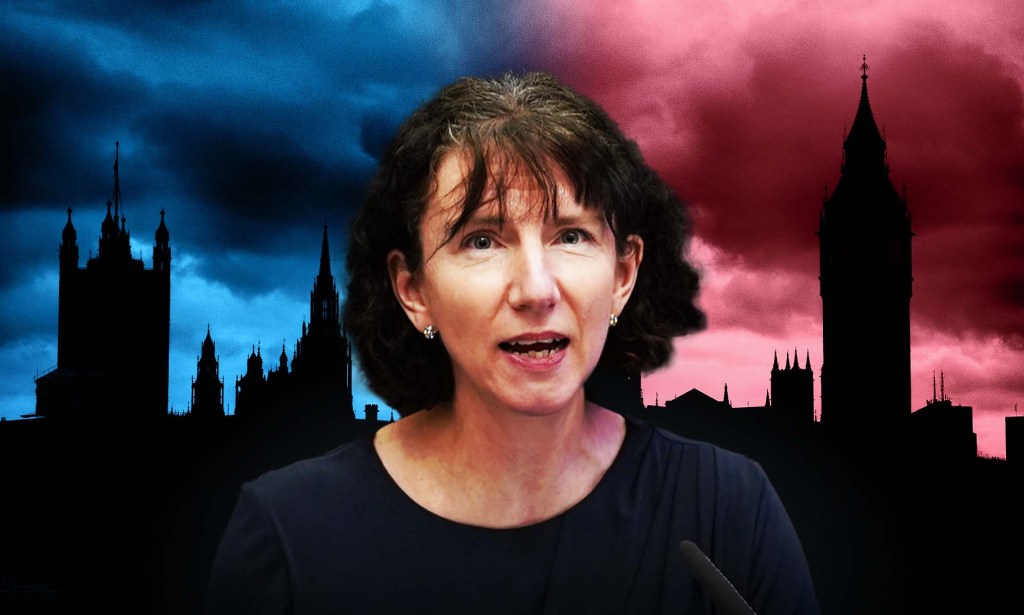Rosie Duffield commends ‘great’ Labour move to roll back trans rights promise

Rosie Duffield has face criticism for her views on trans issues. (GOV)
Labour MP Rosie Duffield has welcomed the party’s new policy on reforming the Gender Recognition Act (GRA), which sees it U-turn on commitments for trans people to be able to self-ID.
Appearing on BBC Radio 4’s Today Programme on Tuesday morning (25 July), alongside trans Liberal Democrat councillor Helen Belcher, the gender-critical MP said she believed Labour is “going in the right direction” and is now just agreeing with what she and others who hold the same views have “been saying for the [past] few years”.
The MP, who has held her Canterbury seat since 2017, said: “It seems to me that Labour have come a long way, perhaps Keir has been on a journey.”
Duffield added that it was “great” that the Labour Party was going in that direction.
Belcher, however, described it as a “backwards step”, noting the Conservatives have made a similar move.
Labour’s policy on reforming the GRA was announced in The Guardian, in a column penned by shadow women and equalities secretary Anneliese Dodds.
The column, which was quickly criticised by LGBTQ+ activists and groups for breaking key promises to the trans community, laid out Labour’s plans to “modernise, simplify and reform” the GRA by removing the “invasive bureaucracy and simplify the process”.
Dodds said Labour’s vision of reform would keep the “medical diagnosis of gender dysphoria” as an “important” part of obtaining a Gender Recognition Certificate – officially confirming the party no longer supports self-ID.
She added that Labour would also remove the panel of “anonymous doctors” who decide on the process, based on “reams of intrusive medical paperwork and evidence of any surgery”. Instead, diagnosis of gender dysphoria by one doctor with a registrar would “be enough”.
This marks a significant change to Labour policy, where, in 2020, the opposition said it was “committed to equality” and fully supported “updating the GRA to introduce self-declaration for trans people”.

Commenting on the changes to Labour policy, Rosie Duffield said she was “really glad” the move away from self-ID has been announced, adding that it was the “core thing” so-called gender-critical feminists on “[her] side of the argument wanted to stop”.
Duffield has long been criticised for her campaigning against trans rights. In June 2023 she was condemned for her “grim” response to comments made in Parliament about trans suicide rates.
Belcher described the change as a negative one which makes the trans community feel “very insecure”.
“What Anneliese Dodds’ piece in The Guardian does is raise more questions than answers,” she said.
Belcher noted that there were “some welcome steps” in the policy change, such as removing the gender recognition panels, but said a number of other areas have been left unclear.
“Which doctors would be allowed to sign a document saying that we are trans [and] what’s the timescale that is going to be reduced?” she asked.
During the segment, the topics of Scotland’s gender law reforms and single-sex spaces were also discussed.
The proposed law in Scotland, which was approved with cross-party support in Holyrood in December, sought to make it easier for trans people to legally change their sex by removing the requirement for a medical diagnosis of gender dysphoria and lowering the age limit to 16, among other updates. It was blocked from gaining royal assent by the government in Westminster.
In her column, Dodds described the bill as “cavalier”, saying it “seemed to be more about picking a fight with Westminster than bringing about meaningful change”.
She failed to mention that the legislation, first pledged in 2016, underwent years of consultation and received more than 17,000 responses from Scots who shared their views on the reforms, before it was initially passed.
“The safeguards that were proposed to protect women and girls from predators who might abuse the system were simply not up to scratch,” Dodds wrote, referring to concerns over provisions for single-sex spaces following the conviction of rapist Isla Bryson.
“As a result, the Scottish government is still picking up the pieces, with trans rights no further forward.”
Labour would not make the same “mistake”, Dodds claimed, stating “nothing in [the Labour Party’s] modernised gender recognition process would override the single-sex exemptions in the Equality Act”.
She continued: “Put simply, this means that there will always be places where it is reasonable for biological women only to have access.
“Labour will defend those spaces, providing legal clarity for the providers of single-sex services.”
In reference to the Bryson concerns, Belcher said: “People of all sorts commit crimes and we don’t necessarily convict the entire group of people that they belong to… [there are] bad apples in every group.”
The UK no longer an ‘international leader on LGBTQ+ rights’
LGBT+ Labour said they found it “very concerning” that the party is “signalling a retreat on their policy of de-medicalised self-ID”, adding that it will “continue to lobby and fight for the rights of all LGBT+ people and push the Labour Party to continue to go further for our trans siblings”.
Meanwhile, Stonewall noted that “the UK has fallen off track as an international leader on LGBTQ+ rights”.
The LGBTQ+ charity called for politicians to examine countries where self-ID has already been introduced for evidence into why the system works. A spokesperson said: “It is wrong to suggest that safeguards cannot exist with a de-medicalised model. The Scottish Gender Recognition Reform Bill was the most scrutinised piece of legislation ever passed by the Scottish parliament and was passed by a solid majority of MSPs with support drawn from all parties.
“If Labour are serious about reforming the Gender Recognition Act and enhancing trans people’s legal protections, we need a strategy informed by input from trans people on their needs and priorities, and a real understanding of how [the] practice is working internationally, not just on legal recognition, but healthcare, anti-discrimination and education.”
How did this story make you feel?

